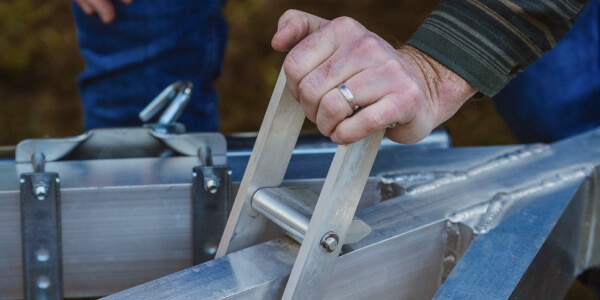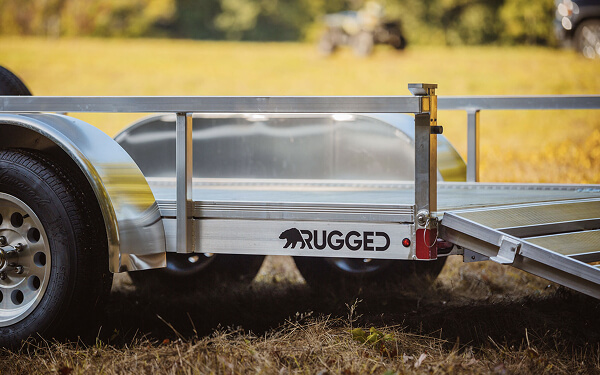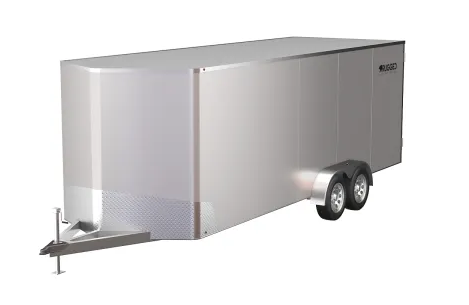Comparing Aluminum vs. Steel Trailers: Pros, Cons, and Key Differences
People need trailers for all types of projects. Utility trailers can haul your ATV or lawnmower. Cargo trailers are the perfect solution for landscapers, construction workers, plumbers, electricians, or anyone with an on-the-go business. Sometimes, it’s just convenient to know that you have the flexibility to transport items of all sizes if needed (everyone loves the friend with the pickup truck, and a utility or cargo trailer fulfills the same purpose).
Trailers are typically made from one of two different materials — aluminum and steel — so when it comes time to pick out a trailer, you have a decision to make. Because steel is heavier, many assume it’s better or stronger. But that’s actually far from the case. In a side-by-side comparison for the average person or small business owner, aluminum trailers will win every time. Why? Continue reading for just a few reasons why aluminum is the superior trailer material.
Aluminum vs. Steel Trailer Comparison
When choosing between aluminum and steel trailers, we recommend considering the similarities and differences. This way, you’ll be able to make the decision that best meets your needs. Start by evaluating both trailer types using the following four factors: durability, ease of maintenance, weight, and cost. Each material has its own strengths and trade-offs, and the “best” option depends on how you plan to use your trailer.
Let’s take a closer look.
Durability
- Steel
Known for their strength, steel trailers are highly resistant to impacts, capable of handling heavy loads, and able to withstand twisting forces. This makes them a good choice for rugged conditions, rough roads, or frequent use with heavy cargo. However, steel is more susceptible to rust and corrosion if not properly treated or cared for, especially in wet or coastal areas and regions with harsh winters and heavy road salt exposure. - Aluminum
Aluminum is naturally rust-resistant, making it ideal for long-term durability in environments that cause steel corrosion. Since aluminum is also lighter than steel, these trailers may not handle extreme stress or heavier loads quite as well. However, modern manufacturing techniques have improved their overall strength.
Ease of Maintenance
- Steel
Steel requires regular maintenance to prevent rust and extend the trailer’s lifespan. This might include repainting, applying protective coatings, or routinely checking for scratches or chips that could expose bare metal. Without proper upkeep and a proactive approach to care, rust can spread quickly once it takes hold. - Aluminum
Aluminum trailers generally require less maintenance than steel. They don’t need protective coatings to keep rust at bay, and their surfaces tend to hold up well over time. Cleaning is usually easier too, though weld points can sometimes weaken if exposed to years of vibration or stress.
Weight
- Steel
Steel trailers are heavier than their aluminum counterparts, which increases towing demands. This can impact fuel efficiency and, depending on the type of loads you plan to haul, may require a more powerful towing vehicle. The added weight can also limit payload capacity since part of the towing limit is taken up by the trailer itself. - Aluminum
Aluminum trailers, on the other hand, are significantly lighter, making them easier to tow with a wider range of vehicles. The reduced weight improves fuel economy, handling, and acceleration. It also frees up more of the towing capacity by allowing more weight for cargo due to the lighter trailer frame.
Cost-Effectiveness
- Steel
On average, steel trailers cost less upfront, making them a budget-friendly option if you need a towing solution at a lower price point. That said, ongoing maintenance costs and the potential for a shorter lifespan in corrosive environments can reduce long-term savings. - Aluminum
Aluminum trailers typically have a higher up-front cost, but their resistance to rust and fewer maintenance needs tend to pay off over time for a solid return on investment (ROI). If you consider yourself a frequent hauler or if you live somewhere that isn’t ideal for steel, aluminum’s longevity can make it a more cost-effective investment over time.

Pros & Cons of Steel & Aluminum Trailers
Choosing between steel and aluminum often comes down to personal priorities. To help you in your decision-making, here’s a helpful table that highlights the benefits and drawbacks of each option.
| Material | Pros | Cons |
| Steel Trailers |
|
|
| Aluminum Trailers |
|
|
Best Use Cases for Aluminum & Steel Trailers
Both aluminum and steel trailers can get the job done no matter how you plan to use them, but the better option depends on differing sets of circumstances.
For Heavy-Duty Construction & Industrial Work…
Best fit: Steel
Steel trailers excel in rugged environments where durability and load capacity are critical. They can withstand the toll of rough terrain, frequent loading and unloading of heavy equipment, and the day-to-day stress of construction sites.
For Recreational Use…
Best fit: Aluminum
Aluminum trailers are lighter, easier to tow, and resistant to rust, making them ideal for hauling boats, personal watercraft, ATVs, or camping gear. Their corrosion resistance is especially valuable if you spend time in coastal regions or if you enjoy water sports.
For Frequent Long-Distance Hauling…
Best fit: Aluminum
For drivers who spend long hours on the road, aluminum’s lighter weight translates into better gas mileage, easier handling, and reduced strain on your vehicle. Over time, these advantages can significantly offset the higher upfront cost.
For Occasional or Budget-Friendly Use…
Best fit: Steel
If you use your trailer occasionally and want to keep costs low, a steel trailer may be the better investment. While it requires more maintenance, the lower purchase price makes sense for infrequent use.
For Farm & Agricultural Work…
Best fit: Steel (for heavy-duty equipment) or aluminum (for livestock and lighter equipment)
Steel trailers are well-suited for hauling heavy-duty farm machinery, while aluminum is often preferred for more lightweight pieces of equipment and livestock trailers since it resists rust caused by animal waste.
For Higher Resale Value…
Best fit: Aluminum
Aluminum trailers tend to hold their value better over time, largely because they resist rust and require less upkeep. For these reasons, aluminum trailers are also commonly viewed as a “safer bet” in the used market, while steel models may lose value faster if corrosion is present.
The Last Aluminum Trailer You’ll Ever Buy
Both steel and aluminum trailers have their place in the market. Steel trailers are often the go-to for buyers who need a tough, budget-friendly option for demanding work. But if you value durability, lower maintenance, and lasting performance, aluminum trailers stand out as the smarter investment. With natural resistance to rust and the ability to hold their value for years to come, an aluminum trailer can truly be the last one you’ll ever need to buy.
Ready to build a trailer that’s an exact fit for your needs (and lasts for the long haul)? Use our Build & Price tool to design your own custom trailer today.


